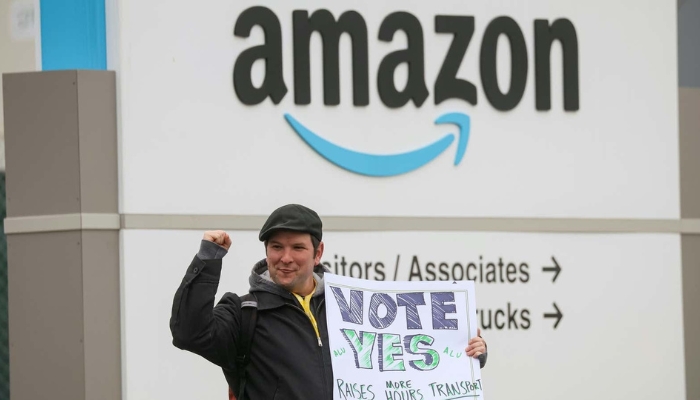
TUC vows to continue fight after GMB misses representing retailer’s staff by 29 votes
After workers at the Coventry warehouse narrowly rejected collective bargaining by a margin of 29 votes, the TUC vowed to keep fighting for union recognition at Amazon.
Voters rejected the request for GMB union representation by 50.5% in a historic ballot that could have resulted in Amazon recognising a union in the UK for the first time. The outcome would have been different if 15 employees had cast different ballots.
TUC General Secretary Paul Nowak stated, “Amazon has done everything to prevent workers from having an independent voice at work.” “The story is not over. We’ll reorganise and keep exposing unethical employers.”
After a year-long struggle for recognition, union leaders said Amazon “created a culture of fear” and employed intimidation techniques to squelch support among the 3,000 workers at the West Midlands region.
Before the vote, GMB activists were allowed into the warehouse for carefully scheduled sessions where they could make their case. Meanwhile, managers conducted separate briefings to argue against recognition.
Senior GMB organiser Stuart Richards suggested the union may file a lawsuit. “Amazon has attacked its own labour fiercely since the beginning. Amazon executives have spent a fortune intimidating workers, forcing them to attend six-hour anti-union workshops, he continued.
After a GMB campaign, in April, the independent Central Arbitration Committee (CAC) awarded workers the ability to cast a legally binding vote. A request for voluntary recognition has been turned down by Amazon. The CAC appointed independent advisers to supervise the voting process.
In the event that employees had voted in favour of recognition, Amazon would have recognised a union for the first time in the UK and the GMB would have been granted the authority to represent them in discussions over wages and working conditions.
It would also have been the first time that employees of Amazon obtained union recognition outside of the United States.
According to Richards, employees were informed that voting in favour of union recognition would result in their losing benefits and no wage raise this year. He declared, “It’s obvious that Amazon cannot be trusted to adhere to the same rules expected of other UK companies. This type of union-busting has no place in 21st-century Britain.”
But this is just the beginning. The flame started by Coventry and UK workers continues to burn as Amazon now faces a judicial challenge.
“Amazon’s anti-union stance has prevailed in this instance, but the underlying issues of work intensity and wages that led to this dispute are still very much present,” said Callum Cant, a senior lecturer at the University of Essex who studies the gig economy.
A union that loses a ballot cannot, as of right now, seek for recognition for the same set of workers for three years. As part of its new agreement for workers, the Labour government has promised to streamline the recognition procedure, but it’s unclear if these adjustments will help the Amazon case.
“We want to thank everyone who participated in this ballot,” said Amazon. At Amazon, we believe that having regular talks and direct interactions with our employees is really important. An essential component of our workplace culture is this. Our staff appreciate this direct interaction just as much as we do.
“For this reason, we have constantly made an effort to hear what they have to say, act upon their suggestions, and make large investments in benefits, competitive pay, and skill development—all within a welcoming, safe environment with fantastic career opportunities.”



